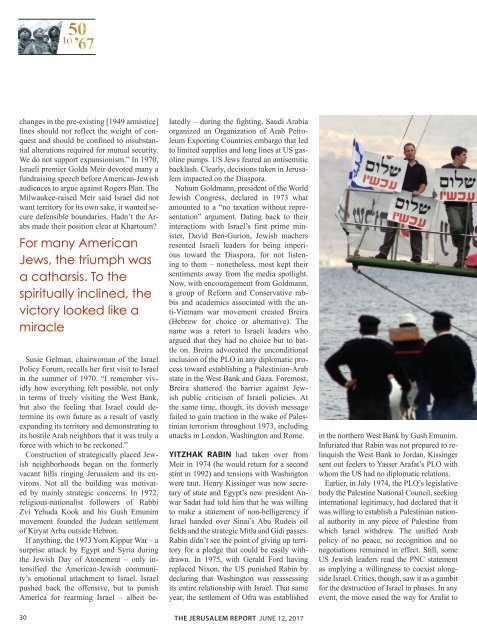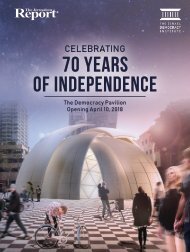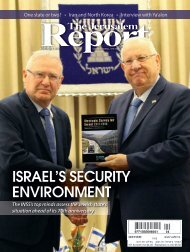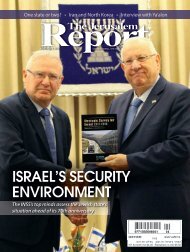report_digital
You also want an ePaper? Increase the reach of your titles
YUMPU automatically turns print PDFs into web optimized ePapers that Google loves.
changes in the pre-existing [1949 armistice]<br />
lines should not reflect the weight of conquest<br />
and should be confined to insubstantial<br />
alterations required for mutual security.<br />
We do not support expansionism.” In 1970,<br />
Israeli premier Golda Meir devoted many a<br />
fundraising speech before American-Jewish<br />
audiences to argue against Rogers Plan. The<br />
Milwaukee-raised Meir said Israel did not<br />
want territory for its own sake, it wanted secure<br />
defensible boundaries. Hadn’t the Arabs<br />
made their position clear at Khartoum?<br />
For many American<br />
Jews, the triumph was<br />
a catharsis. To the<br />
spiritually inclined, the<br />
victory looked like a<br />
miracle<br />
Susie Gelman, chairwoman of the Israel<br />
Policy Forum, recalls her first visit to Israel<br />
in the summer of 1970. “I remember vividly<br />
how everything felt possible, not only<br />
in terms of freely visiting the West Bank,<br />
but also the feeling that Israel could determine<br />
its own future as a result of vastly<br />
expanding its territory and demonstrating to<br />
its hostile Arab neighbors that it was truly a<br />
force with which to be reckoned.”<br />
Construction of strategically placed Jewish<br />
neighborhoods began on the formerly<br />
vacant hills ringing Jerusalem and its environs.<br />
Not all the building was motivated<br />
by mainly strategic concerns. In 1972,<br />
religious-nationalist followers of Rabbi<br />
Zvi Yehuda Kook and his Gush Emunim<br />
movement founded the Judean settlement<br />
of Kiryat Arba outside Hebron.<br />
If anything, the 1973 Yom Kippur War – a<br />
surprise attack by Egypt and Syria during<br />
the Jewish Day of Atonement – only intensified<br />
the American-Jewish community’s<br />
emotional attachment to Israel. Israel<br />
pushed back the offensive, but to punish<br />
America for rearming Israel – albeit belatedly<br />
– during the fighting, Saudi Arabia<br />
organized an Organization of Arab Petroleum<br />
Exporting Countries embargo that led<br />
to limited supplies and long lines at US gasoline<br />
pumps. US Jews feared an antisemitic<br />
backlash. Clearly, decisions taken in Jerusalem<br />
impacted on the Diaspora.<br />
Nahum Goldmann, president of the World<br />
Jewish Congress, declared in 1973 what<br />
amounted to a “no taxation without representation”<br />
argument. Dating back to their<br />
interactions with Israel’s first prime minister,<br />
David Ben-Gurion, Jewish machers<br />
resented Israeli leaders for being imperious<br />
toward the Diaspora, for not listening<br />
to them – nonetheless, most kept their<br />
sentiments away from the media spotlight.<br />
Now, with encouragement from Goldmann,<br />
a group of Reform and Conservative rabbis<br />
and academics associated with the anti-Vietnam<br />
war movement created Breira<br />
(Hebrew for choice or alternative). The<br />
name was a retort to Israeli leaders who<br />
argued that they had no choice but to battle<br />
on. Breira advocated the unconditional<br />
inclusion of the PLO in any diplomatic process<br />
toward establishing a Palestinian-Arab<br />
state in the West Bank and Gaza. Foremost,<br />
Breira shattered the barrier against Jewish<br />
public criticism of Israeli policies. At<br />
the same time, though, its dovish message<br />
failed to gain traction in the wake of Palestinian<br />
terrorism throughout 1973, including<br />
attacks in London, Washington and Rome.<br />
YITZHAK RABIN had taken over from<br />
Meir in 1974 (he would return for a second<br />
stint in 1992) and tensions with Washington<br />
were taut. Henry Kissinger was now secretary<br />
of state and Egypt’s new president Anwar<br />
Sadat had told him that he was willing<br />
to make a statement of non-belligerency if<br />
Israel handed over Sinai’s Abu Rudeis oil<br />
fields and the strategic Mitla and Gidi passes.<br />
Rabin didn’t see the point of giving up territory<br />
for a pledge that could be easily withdrawn.<br />
In 1975, with Gerald Ford having<br />
replaced Nixon, the US punished Rabin by<br />
declaring that Washington was reassessing<br />
its entire relationship with Israel. That same<br />
year, the settlement of Ofra was established<br />
in the northern West Bank by Gush Emunim.<br />
Infuriated that Rabin was not prepared to relinquish<br />
the West Bank to Jordan, Kissinger<br />
sent out feelers to Yasser Arafat’s PLO with<br />
whom the US had no diplomatic relations.<br />
Earlier, in July 1974, the PLO’s legislative<br />
body the Palestine National Council, seeking<br />
international legitimacy, had declared that it<br />
was willing to establish a Palestinian national<br />
authority in any piece of Palestine from<br />
which Israel withdrew. The unified Arab<br />
policy of no peace, no recognition and no<br />
negotiations remained in effect. Still, some<br />
US Jewish leaders read the PNC statement<br />
as implying a willingness to coexist alongside<br />
Israel. Critics, though, saw it as a gambit<br />
for the destruction of Israel in phases. In any<br />
event, the move eased the way for Arafat to<br />
30<br />
THE JERUSALEM REPORT JUNE 12, 2017

















